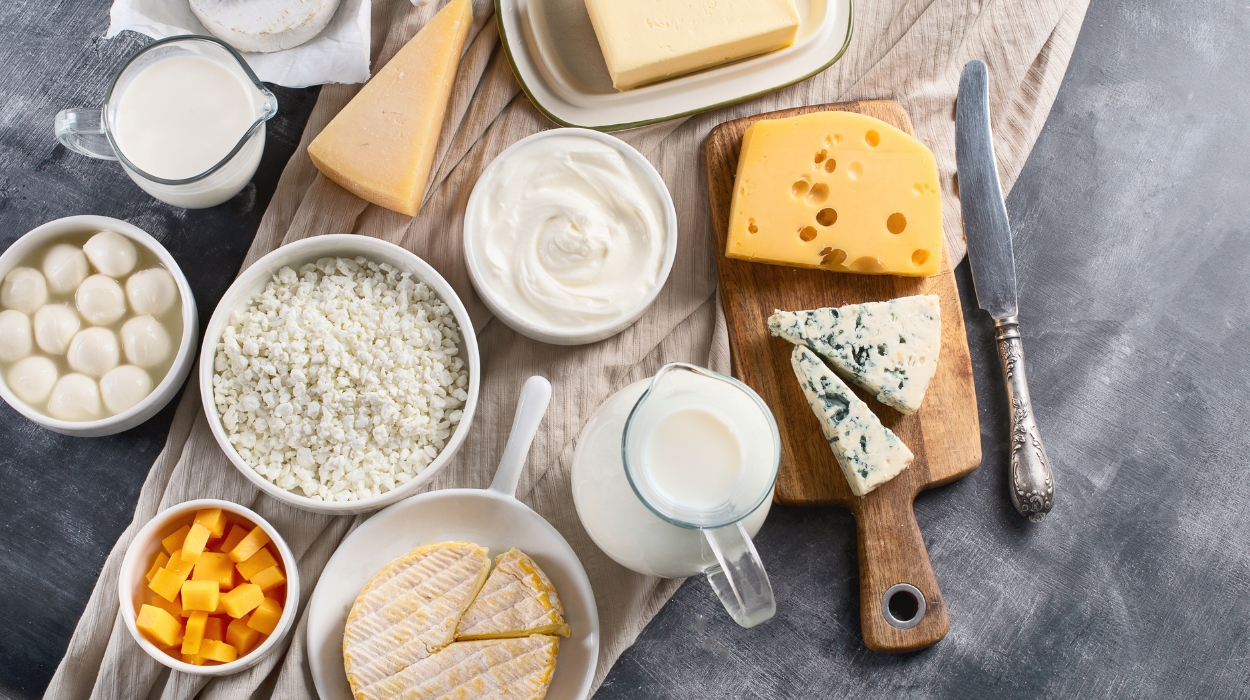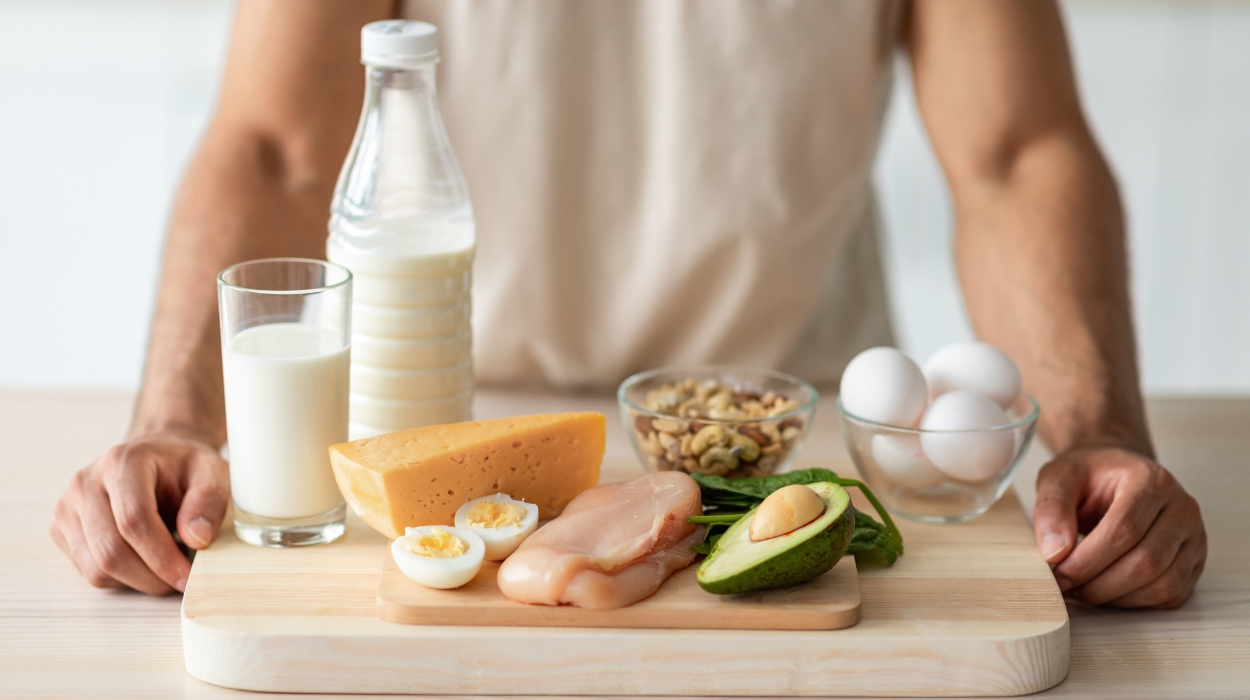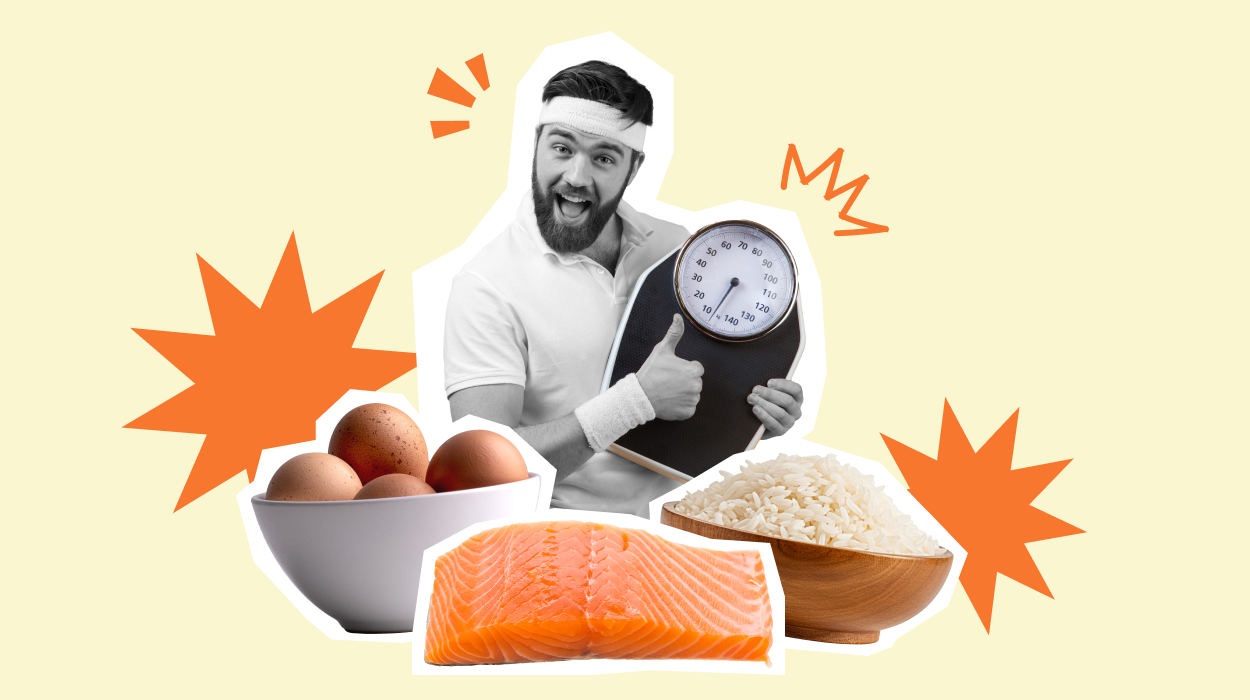When it comes to gaining weight, there are quick and unhealthy ways to do it, such as loading up on processed foods (which contain saturated fat, excess sugar, and chemicals), and then there are healthier ways to go about it, such as choosing whole, nutrient-dense foods. Weight gain is not all about calories – the quality of the calories matters. Discover 10 of the best whole foods to include in your diet to help add weight to your body.
Top 10 Weight Gain Foods 2024
- Rice
- Eggs
- Dairy
- Dried Fruit
- Red Meat
- Fatty Fish
- Potatoes/Starches
- Whole Grain Bread
- Avocados
- Nuts and Nut Butter
Top 10 Healthy Foods To Gain Weight Fast
Rice
Rice is relatively inexpensive and easy to make, plus it’s packed with calories, making it an ideal side dish for meals if you want to put on weight. One cup of rice has over 200 calories and roughly 45 grams of carbohydrates. Rice, especially wild or brown rice, is a whole grain, which offers B vitamins among other nutrients, so you can feel good about making rice a regular part of your diet, knowing you’re not compromising your health. Additionally, rice lends itself to additional sources of calories when it comes to flavoring or seasoning the rice – try adding a little cheese, butter, or chopped meat, scrambled eggs, and veggies to make a stir fry.
Eggs
Eggs are a staple for any muscle-building diet. They are an excellent source of fat, protein, and vitamins. There are 6 grams of protein in one egg and almost 75 calories, but don’t forget to eat the whole egg – white and yolk! Most of the nutrients are found in the yolk. When choosing eggs, whenever possible, opt for pasture-raised or organic, as this ensures that the chickens have the best quality of life and are fed their most natural diet, while not having any hormones or steroids administered to them. Eggs can be an irritant for some people, especially those with egg allergies. But as long as you don’t react to them, they are great to include in your daily diet for healthy weight gain, especially because they are versatile – omelets, in salads, on sandwiches, eaten hard-boiled as a snack, and so forth.
Dairy

Dairy is a controversial food, especially in the U.S. where some farming methods create questionable consequences for the quality of the products. However, if you have access to organic and unprocessed dairy products (and you’re not lactose intolerant), adding dairy to your diet can be extremely helpful for weight gain. This is due mostly to the high fat content in addition to the quality of protein and carbs. In fact, dairy is one of the few foods that contain all three macronutrients – fat, protein, and carbs. Milk contains both casein and whey protein, which can greatly impact muscle building, especially when combined with weight lifting. Milk and other forms of dairy can be added to meals or eaten alone as a snack.
Dried Fruits
The process of drying fruit concentrates its sugars, which then enhances its calories. This makes them a great snack or dessert to add to your diet if you’re looking to gain weight. Dates in particular are known for their high sugar content – two dates add up to 130 calories.
Additionally, though there is more sugar in dried fruits, they retain all their nutrients, including antioxidants and fiber. Dried fruits are easy to eat on their own, in oatmeal, cereal, rice dishes, or added to spreads like peanut butter or cream cheese. Ideally, dried fruits should be paired with nuts or yogurt (something with fat and protein) to create a more balanced and blood sugar-stabilizing snack.
Red Meat
It can be challenging for some vegans to gain weight healthily because animal protein, particularly red meat, can help increase weight. Red meat contains leucine, an amino acid the body needs to help build muscle protein, as well as creatine, which is used as a supplement to enhance muscles. A 6-ounce steak has about 450 calories and almost 50 grams of protein. When choosing red meat for weight gain, specifically, it’s best to opt for fattier cuts, rather than lean ones. Additionally, it’s important not to overlook quality when it comes to red meat – when possible, opt for grass-fed, organic beef as opposed to conventional meat which may contain unnecessary and harmful hormones and antibiotics, and in which the cows may have been fed a less-than-ideal diet.
Fatty Fish
Oily fish contains a powerful combo of protein and healthy fats, which together, add up to healthy calories for weight gain. Salmon, sardines, and mackerel are a few examples of oily, fatty fish with omega-3 fatty acids. Oily fish are consumed regularly by some of the healthiest populations on the planet, which is why oily fish are often associated with longevity. With canning practices, eating lots of oily fish does not require daily trips to the fish market.
Though fresh is always best, canned salmon, tuna, and sardines are readily available in most supermarkets and provide adequate health benefits. It’s easy to prepare fish by fileting, frying, baking, or steaming, and any cooking method can be topped with a good dose of olive oil for added omega-3 healthy fats. As with red meat, it’s important to check for quality when purchasing fish – try to buy wild-caught fish, as opposed to “farmed,” because wild-caught fish will not contain any coloring or antibiotics, whereas many farmed fish do.
Potatoes/Starch
There’s a reason why some people avoid “carbs” when losing weight – they are a hefty source of calories. This comes in handy when trying to add weight. Potatoes and other starches (such as rice, quinoa, buckwheat, corn, squash, oats, and beans) are a valuable source of carbohydrates and, in addition to helping with weight gain, provide the body’s preferred fuel source for energy – glucose. If you choose whole grains and starches, you’ll also be adding essential nutrients, fiber, and prebiotics to your diet (cooked then cooled rice and potatoes turn into resistant starches which act as prebiotics – they feed the good bacteria in the gut). Potatoes and grains also lend themselves to additional toppings and flavorings (such as cheese, seeds, and butter) which add to the calorie content.
Whole Grain Bread
Whole grain bread (unrefined bread) contains complex, or slow-digesting carbohydrates and generally contains higher amounts of protein compared with white bread. The same is true for whole grains in other forms where you can see the whole grain – oats, quinoa, whole grain cereal, etc. What’s more, whole grains and whole grain bread lend themselves to toppings that can increase their caloric load – nut butter, cheese, and avocado can be spread on toast, and whole grains can be added to smoothies, cereals, and yogurts. Many protein bars are made with whole grains, however, as with other foods, be sure to look out for quality. Read the label for excessive, unnecessary ingredients, such as sugar and preservatives. A granola bar that is mostly sugar will have more of a negative impact on your health than unsweetened granola.
Avocados
Avocados are “nature’s butter,” boasting inherent healthy fats, while also offering fiber, calcium, magnesium, and potassium. Any dish, smoothie, or sandwich can be dressed up with more calories by simply adding a few slices of avocado. Most fruits and vegetables contain little or no fat, but avocados are an exception – the high-fat content provides a variety of health benefits including better cognition, hormone balance, and improved digestion, in addition to muscle building and weight gain.
Nuts & Nut Butter
Nuts and nut butter are other rare examples of food containing the three macronutrients – protein, fat, and carbs. This is packed with vitamins, fiber, minerals, and brain-healthy omega-3 fats. Nuts often make their way into snack bars because they’re so calorie-dense and filling, often eaten as snacks or added to oatmeal and baked goods. There are roughly 170 calories in just one handful of raw almonds. As with other foods, it’s important to choose good quality, organic brands, to avoid any pesticides that may be sprayed on conventional nuts.
Additionally, when purchasing nut butter, opt for brands that have no additional fillers or sugar – the nut butter is calorie-dense enough, and excess sugar would only deter from optimal health. Also be sure to get some variety by eating a few handfuls of different nuts every day–almonds, walnuts, cashews, Brazil nuts, pecans, and pistachios. This can help build muscle and add weight.
How Can Weight Gain Diet Foods Help?
Being underweight[1] can pose health consequences, such as trouble conceiving, osteoporosis, and anemia, which is why it’s important that, if your body mass index (BMI) is under 18.5 (meaning your weight is low in relation to your height) you may want to consider a diet that helps to add weight to your body. Of course, there are ways to add weight which may be unhealthy – consuming foods that have empty and “fattening” calories, such as those that come from processed foods, ice cream, pizza, sugar, and so forth. These types of foods can cause health complications, however, there are whole, natural foods that contain dense calories which can provide the necessary pounds without contributing to the risk for disease.
How To Add Food For Weight Gain To Your Diet?

Adding any of these weight-gaining foods into your diet is simple, but the preparation will differ depending on the food itself. For example, eggs, red meat, and fatty fish will require cooking (unless you buy canned fish). However, once the eggs, meat, and fish are cooked, they can be enjoyed on a dinner plate, in a salad, on a sandwich, or added to soups. Nut butter, avocado, and dried fruit are more versatile – they can be added to smoothies, oatmeal and cereals, baked goods, salads, spread on bread, and eaten alone as snacks.
The important takeaway is that your plate is prime real estate – everything you ingest has an impact on your health and your weight. Every time you sit down to a meal, ensure it contains the right foods in the right portions that suit your muscle and weight gain goals.
Consider the following meal as an example of a healthy weight gain plate:
- Wild-caught salmon cooked in olive oil
- Side of brown rice with organic butter
- Side salad with sliced avocado and olive oil dressing
- Side of sweet potatoes
- Dessert: Strawberry banana smoothie with almond milk, peanut butter and dried fruit added
Other Tips For Going On A Weight Gain Diet
When looking to add weight to your body, follow these tips to be successful and healthy:
Go Low And Slow
if you’re increasing your fat, protein, or carbs, don’t increase anything too much too quickly. Give your body a chance to get used to each macronutrient. Slowly increase your protein, fat, and carbs to your tolerance.
Eliminate Daily
When introducing new foods in higher amounts, it’s important to give your body processing time so that it assimilates all the nutrients correctly and detoxifies the toxins daily. Make sure you eliminate (or have a bowel movement) at least once a day.
Choose Quality Over Quantity
Always read the ingredients. Choose whole, unprocessed foods. When choosing meat, go for grass-fed and organic, for eggs, go for pasture-raised, and for fish, choose wild-caught.
Be Diverse
The body needs a diversity of different foods (this is especially true for plant foods) in order to thrive. When adding more weight-gaining foods, try to mix it up so you’re not only eating potatoes or avocados all the time. One night has fish, the next night has steak, then the following has eggs, etc. Try to get as much variety as possible.
Work Out
Part of gaining body weight means building muscle. You may want to consider a weightlifting routine in addition to your dietary changes.
Eat Small Meals More Frequently
Rather than 3 big meals a day, try eating 4-5 small meals a day. This may help the body retain more calorie intake.
Don’t Drink Water Close To Meals
Stay hydrated in between meals, but not just before meals. Drinking water too close to meals can cause us to feel full, leading us to miss out on calories.
Choose Higher-Fat Cuts Of Meat
When eating chicken or turkey, the legs and wings of poultry have a higher fat content than the breasts. For fish, opt for fattier fish over white fish.
Conclusion
Gaining weight requires a conscious effort to include more calories in your diet, however, not all calories are created equal. Rather than choose fast and processed foods, filled with chemicals, fillers, and inflammatory ingredients that can lead to disease, it’s best to prioritize whole, nutrient-dense, high-calorie foods such as rice, eggs, red meat, fatty fish, dairy, potatoes, nuts, avocados, and whole grains – foods will supply the extra calories while also providing significant health benefits.
Frequently Asked Questions
Any diet works best when you have variety. While you don’t need to eat all of these foods, they are all excellent options, so if you tolerate and enjoy them, try to rotate as many different calorie-dense foods as possible.
Everyone is different, but if you include these ten foods in your diet regularly, while also exercising to build muscle mass, you can expect to see weight gain in a few weeks.
Whole grains, avocados, rice, nuts/nut butter, potatoes, and other starches are nutrient-dense and high in calories while containing no animal protein. Adding olive oil to any dish is also a great way to increase vegan calories.
 Expert's opinion
Expert's opinion
